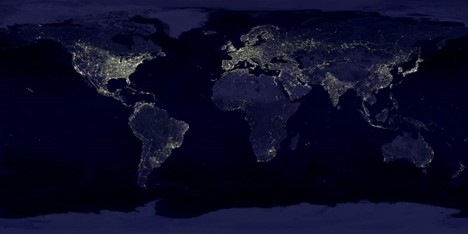“After this, there is no turning back. You take the blue pill—the story ends, you wake up in your bed and believe whatever you want to believe. You take the red pill—you stay in Wonderland, and I show you how deep the rabbit hole goes.” –Morpheus, The Matrix, Warner Bros., 1999
We don’t think DaVinci Code‘s Sir Leigh Teabing (Ian McKellen) ever bumped into generative AI when he said, “The mind sees what it chooses to see.” We know AI is the savior of the universe; but increasingly, the stuff that gets the most visibility is crap your mind doesn’t want to see.
Accounting firm PWC projected that by 2030, artificial intelligence will contribute more than $15.7 trillion to the world economy and boost local economies’ GDP by 26%. It’s going to make everything great, do no harm, and make our lives so much easier. The discovery of fire, the invention of the wheel, the industrial revolution, the invention of the computer, heck, even the rollout of the Internet pale by comparison.
And if it’s used the wrong way, we’ll develop laws to ensure it’s safe.
Are you s****ing us? Even Elon Musk (and we’re far from one of his fans) believes AI “is one of the biggest threats to humanity.”
Okay, the genie is out of the bottle.
According to industry analysts, there are about 70,000 AI companies around the globe; one in four is based in the US, but according to many “experts,” China is on track to be the global leader. IBM’s Global AI Adoption Index shows that 85% of businesses are using/exploring AI, and 50% of the firms have reported significant savings using AI. Attend any convention, and 100% of the products, services, and toys being introduced will have AI in them––even if the folks in the booths can’t pronounce the word.
In other words, AI is the hottest thing to make big bucks with. And what could possibly go wrong? It’s as soft and cuddly as a doll or as cute and as exciting/fun as a Barbie movie, despite the fact that it has all of the potential side effects of Oppenheimer.

But AI is so all encompassing that it means different things to different people so, let’s focus on something that in one way or other touches everyone … entertainment.
Last year, the Writers Guild of America (WGA) and SAG–AFTRA shut the US video content industry down for five months while they worked to hammer out AI guardrails (and other stuff) with the Alliance of Motion Picture and Television Producers. The shutdown cost California’s economy an estimated $30 million a day, the industry an estimated $2.1 billion, and a huge backlog of movie/show productions that will take a couple of years to dig out from under.
The rest of the industry around the globe paid close attention because folks knew that sooner or later, AI would help/affect them. All of the participants claimed success, even as the US industry shed 37,700 jobs, according to Milken Institute. Don’t get us wrong, AI will continue to help the industry produce a steady stream of blockbusters, good/decent, and ho–hum/sucky projects.
We’re really impressed with the results we’ve seen when AI is combined with Unreal Engine’s real–time 3D tools and Nvidia’s advanced GPUs, which have helped creatives produce ultra–real visuals and immersive content. Add to that the new AI-enabled tools Adobe and Avid have introduced for postproduction folks, and we’re seeing shows that are better than we could have ever hoped for or imagined.
And let’s not forget that we get to see/enjoy shows from every studio and indie around the world, thanks to AI-enabled sub/dub technology. If that’s not enough, you can be sure it will play a good, bad, ugly role in the US’s biggest comedy/drama/horror/thriller/crime/action show that takes place every four years… the election.
But sorry folks, no politics discussed here––moving on.
Thanks to the huge amount of data you provide them and they scrape every time you watch one of their shows/movies, studios and streamers are able use AI to more precisely shape and create video content most folks are going to like so they stick around longer and hopefully don’t bail on the streaming service. Recommendation engines have improved significantly over the years as streamers fight to keep us from leaving their silo of content for someone else’s. The big problem is that one service’s AI engine doesn’t have a clue as to what’s available on the other four ad–supported and two free services, so we still go from one service to another until we settle on something to watch.
Okay, they might, but if they do, they don’t say, “Hey, if you really want to watch something tonight that is going to be totally down your alley, go over to (name) and tell ’em we suggested this.” Maybe someday, but if it does, we’re going to miss wasting 10–15 minutes jumping around, searching, thinking about it, and finally settling, knowing we had the final decision.
Being married and with two kids, it’s one of the few decisions we get to make… occasionally.
Whether you read it, watch it, listen to it, or make it, information and entertainment is a big and vital industry. It seems like everyone is interested in using AI when it comes to basic, routine stuff.
Yes, there’s been a lot of stumbling along the way when it comes to identifying/treating people as people. This has been attributed to the “fact” that most of the developers are guys, white guys, so, lots of work is done/redone to ferret out biases like race, gender that helps make each of us unique.
Major things like this are being addressed, solved. What is not being solved are the stupid, vicious applications of AI that go beyond being cute/funny but are downright embarrassing and expensive to all of us. Sure, we all heard (and perhaps even saw) the fake, sexually explicit images of Taylor Swift that made the rounds. A cybersecurity expert said they were probably made by a diffusion model of AI technology that is available on more than 100,000 apps and development models.
AI–savvy folks have been so focused on being first in the marketplace that they’ve unleashed tools that can create images, videos, text, and audios to embarrass or, worse, hold people up to shame/ridicule. That sucks, but what is really sick is the fake kiddie and revenge porn that flood the Internet.
That kind of stuff endangers men, women, and innocent little children.
Not cool.

More than 5 billion people use the Internet every day, accessing more than 2 billion websites and using about 20 billion devices. So, once this kind of stuff is posted on the Internet, it is almost impossible to eliminate because it’s out there… somewhere.
People interested in making a fast buck are using AI to copy/create music and short/long video (maybe even yours) to peddle it to unsuspecting individuals. They’ve done it with “fresh” Robin Williams appearances, and not long ago, the Dudesy podcast was sued by George Carlin’s estate for copyright infringement when they used AI to create a “new” George Carlin special. We’re glad they drew a line in the sand on this kind of theft, but it isn’t the first and certainly won’t be the last.
We readily admit that sites almost everywhere are trying to remove this kind of AI garbage, but it really is like playing whack–a–mole. As fast as it’s removed, the same or newer/better AI-generated deepfakes pop up somewhere else. And while industry analysts like to hype how valuable AI is going to be for the world and industry, they also quietly admit that jobs will be lost, especially routine/boring/repetitive jobs as well as dangerous jobs.
The big hit in the content creation/production industry will probably be middle–level positions that simply shuffle paper and green-light/monitor projects after they’ve been thoroughly conceptualized, vetted, and double–checked by working folks close to the work and AI assistants.
But with all of the new, free AI tools out there, kids and adults have found an ingenious way to rip off studios and streamers. Rather than go to the theater and iPhone something like Barbie to share, or go to a pirate video site to get the show free along with malvertising, malware, and crap that can mess up your device and life, they came up with a smart way to “borrow” the film and share it. Yes, we begrudgingly admire their creative way of stealing valuable content and giving it away.
They capture 3- to 5–minute segments and post them on any of the public video sites—TikTok, YouTube, Instagram, Snapchat, and the hundreds of others that are out there designed to educate, entertain, and market stuff. You jump from video to video, site to site, and Bam!, you saw the whole movie without buying the movie house’s expensive/stale popcorn.
But it’s a rotten use of AI because it’s stealing content and money from a bunch of hardworking, creative folks. It’s not a victimless crime. However, the use of AI that’s going to affect everyone is the increasingly sophisticated use of AI for ad theft, including ad stacking, domain/source/pixel spoofing, click/location/viewing/affiliate fraud, redirecting attacks, and stuff AI hasn’t even thought of… yet.
It will hit:
- Streamers offering reduced subscriptions along with some ads, but folks will siphon off huge sums.
- Content creators/producers will be impacted because studios/streamers will have less to invest in new projects.
- Advertisers will pay for click/impression fraud, domain stuffing, malvertising, and bot clicks, funneling huge sums to AI-controlling thieves.
- Consumers will be hit because their money doesn’t go for the product/service they buy, but rather into thieves’ pockets instead.
New AI tools are making it faster, easier, and more profitable for ad thieves to take money from everyone in the video content food chain. It costs investors, creators/developers, streamers, advertisers, and consumers billions every year. According to Juniper Research’s ad fraud report, the cost last year was about $84 billion and will rise to more than $170 billion by 2028.
Products like MagicVideo–V2, Lumiere, Midjourney, Pika, Moonvalley, Assistive, Runway, and hundreds of AI image- and video-generation tools will replace thousands of people with consciences, with code that has no fear of punishment or consequences. All of that money will be spent on reaching eyes that aren’t alive, don’t breathe, don’t watch content, don’t spend a dime. They were developed, exist, and work relentlessly to do one thing… steal!

Everyone, and every corporation, is blindly running to develop, release, use AI and LLMs as rapidly as possible to gain a competitive advantage—all without really worrying about the fact that the stuff can and will evolve and enhance itself to be more efficient, effective, and, possibly, just possibly, with disastrous results.
That rapid rush to deliver the best, most powerful AI tool could turn that dystopian sci-fi movie script into reality, and no amount of legislative action is going to make things better.
As Neo said in The Matrix, “I don’t like the idea that I’m not in control of my life.”
AI can do a lot of good and deliver a lot of benefits; but somehow, we don’t believe the techies who say they have the morals and skill to ensure s*** doesn’t happen. But then, we don’t have a choice between a red or blue pill.